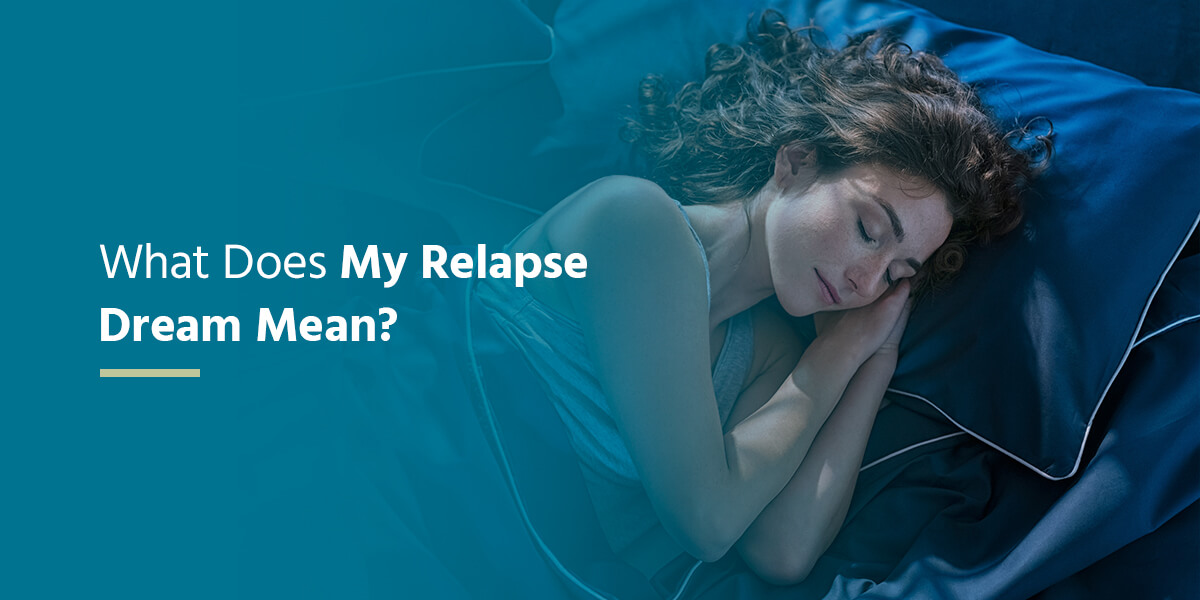
What Does My Relapse Dream Mean?
Relapse dreams are when a person dreams about using a substance while in recovery. These dreams usually consist of using the substance the person commonly used before they began treatment, but they can include the use of new substances.
Drug relapse dreams are usually very realistic. You can dream about using substances with people or in places you have in the past or of specific traumatic events associated with your substance use disorder (SUD).
Once you wake up from these dreams, you might feel guilty, anxious or ashamed. Relapse dreams in recovery can be overwhelming, but the good news is that there are ways to cope with these dreams to make them more bearable when they occur.
Continue reading to learn how to manage relapse dreams and find support if you have one.
How Common Are Relapse Dreams Amongst Recovering Addicts?
Some people think that once they have addiction relapse dreams, it’s a sign they’ll start using again. However, you shouldn’t be discouraged if you have one of these dreams. Nearly everyone has a relapse dream at any point in the recovery process. They may be more common when you first start treatment as your subconscious mind adjusts to a new routine.
The longer you’re in recovery and the more comfortable and confident you are in your ability to abstain from substances, the less frequent relapse dreams will occur. At first, you may experience fear when you start to have these dreams, but you can rest easy knowing they’re quite harmless.
However, you should still pay attention when you have these dreams and take steps to identify the triggers or causes to help you cope with intense feelings and reduce their frequency.
Why Do Relapse Dreams Happen?
Relapse dreams can happen for several reasons, and they may be more intense depending on how severe a person’s substance use was and how long they’ve been in recovery.
Since people with substance use disorders commonly have a history of trauma, traumatic events associated with substance use can also trigger relapse dreams. The subconscious mind is trying to process the trauma and focuses on the habits, patterns or beliefs developed during traumatic experiences to help you understand and heal from these events.
If you have a co-occurring mental health condition, it could intensify these dreams since mental health conditions can compound the intensity of your traumatic experiences. Dreams allow you to process these uncomfortable memories and feelings in a safe and secure environment.
Another reason relapse dreams occur is because you’re focused on your recovery. During treatment, you’re learning how to take back control of your behaviors and adopt new skills. The subconscious mind will connect past behaviors and new information to help you remember these skills.
Relapse dreams can indicate that you’re making good progress in your recovery. However, relapse dreams can be uncomfortable and alarming, so it’s essential to identify the triggers and learn how you can reduce the effects and intensity of these dreams.\

How to Cope With Relapse Dreams
Sometimes, relapse dreams can indicate progress in recovery, but that doesn’t mean they’re comfortable to experience. You can use certain coping mechanisms to help you manage your thoughts and feelings brought about by these dreams and potentially reduce their frequency.
If you start to experience relapse dreams, try using these coping mechanisms:
- Identify your trauma: Trauma is one of the main reasons people experience relapse dreams. You can take steps to identify unresolved trauma by enrolling in a counseling program. You’ll speak with a trained professional who can help you find the source of your emotional trauma. Counseling can also help you address mental health conditions through specific therapy practices, such as cognitive behavioral therapy, to help your process your trauma.
- Share your experience: Talking to someone about your relapse dreams can help you move past them sooner. If you attend group therapy or 12-step meetings, you can share your dreams with people in the group, and you’ll likely find that others have experienced the same thing. It’s encouraging to know you’re not alone in your experiences.
- Ground yourself in reality: While relapse dreams can seem real in the moment, it’s only a dream at the end of the day. Understanding that these dreams are nothing more than your subconscious processing your feelings and trauma can help ground you in reality. Having a relapse dream doesn’t mean you’re going to relapse. These dreams may be uncomfortable until you learn how to cope with them, but you’re in complete control of your reaction to them.
Finding Support After Having Relapse Dreams
If you’ve had a relapse dream, it can be frustrating, as you’re trying to move through recovery and put your past behind you. The good news is you can find support and move past relapse dreams. The reality is that these dreams are only temporary, and they’ll likely improve as you progress through recovery. Your body and mind are simply readjusting to sober living and establishing a balance.
There are many tools and resources you can utilize to help you find support after a relapse dream. Using healthy coping skills can help you cope with uncomfortable feelings, and talking with a professional can help you get to the root of the problem.
One way you can find support after a relapse dream is to rely on your relapse prevention plan established during treatment. Your plan should give you specific information on caring for yourself when you feel like you might relapse. A relapse prevention plan might include:
- Self-care practices
- Support group meetings
- Individual therapy
- Mindfulness practices
- Relapse prevention education
You should also look to your support group to help you when you’ve had a relapse dream. Members of your support group can be friends, family members or a sponsor who you can call when you have concerns or experience cravings. A robust support network is vital to your recovery.
Enroll in Crest View Recovery’s Outpatient Rehab
Relapse can happen to anyone during the recovery process, but it doesn’t mean you’ve lost all of your progress. Crest View Recovery Center is here to help with our outpatient services if you’ve relapsed. Outpatient care can be a good fit if you’ve relapsed since you’ve likely been through rehabilitation in the past. When you enroll in our outpatient rehab program, you’ll have access to many familiar resources.
Whether you’re dealing with alcohol use or drug use, Crest View Recovery Center has you covered. Our staff aims to provide you with the highest quality of care possible, and we can help you regain your footing after a relapse. Contact us today to learn more about our outpatient services and how we can help you thrive in sobriety.
Linked Sources:
- https://www.journalofsubstanceabusetreatment.com/article/S0740-5472(18)30370-2/fulltext
- https://www.ncbi.nlm.nih.gov/pmc/articles/PMC3051362/
- https://nida.nih.gov/publications/research-reports/common-comorbidities-substance-use-disorders/part-1-connection-between-substance-use-disorders-mental-illness
- https://crestviewrecoverycenter.com/addiction-blog/healthy-coping-skills-for-addiction-recovery/
- https://crestviewrecoverycenter.com/cognitive-behavioral-therapy-for-substance-abuse/
- https://crestviewrecoverycenter.com/what-we-treat/alcohol/
- https://crestviewrecoverycenter.com/what-we-treat/drug-addiction/
- https://crestviewrecoverycenter.com/addiction-resources/contact/




